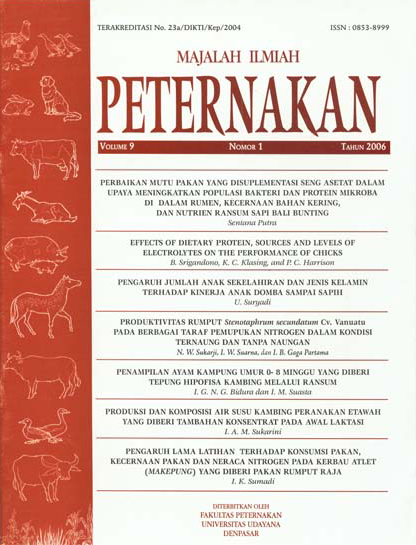EFFECT OF TIME AND FREQUENCY OF MATING TO THE NUMBER AND MORTALITY OF EMBRYOS IN BALI GILTS
Abstract
SUMMARY The aim of this study is to ascertain, when the time and frequency of mating should be carried out in Bali gilts to minimize embryonic mortality. A total of 18 Bali gilts and one mature Bali boar were used on this study. This study used Completely Randomized Design (CRD) with three treatments and six replications. Treatment 1 (T1) was a single mating on day-1 of estrous; Treatment 2 (T2) was a single mating on day-2 of estrous; Treatment 3 (T3) was double matings on day-1 and day-2 of estrous. Calculations on the number and mortality of embryos were carried out on day-25 of gestation. The percentage of embryonic mortality was known by calculating the difference between the number of corpora lutea in the ovary and the number of embryos the in uteruse divided by the number of corpora lutea in the ovary, multiplied by 100%. The result of this study showed the average number of embryos in Bali gilts in T1, T2 and T3 was 2.66, 7.00 and 7.17 embryos, whereas the average mortality of embryos in T1, T2 and T3 was 70.14%, 24.45%, and 21.13%, respectively. There was a significant (P < 0.05) increase in the embryo number when a single mating was conducted on day-2 of estrous and highly significant (P < 0.01) when a double mating was conducted on day-1 and day-2 of estrous in Bali gilts. On the contrary, there was a highly significant (P < 0.01) decrease in embryo mortality both on a single mating on day-2 of estrous or a double mating on day-1 and day-2 of estrous compared to a single mating on day-1 of estrous.Downloads
Download data is not yet available.
Published
2012-09-02
How to Cite
SUYADNYA, P..
EFFECT OF TIME AND FREQUENCY OF MATING TO THE NUMBER AND MORTALITY OF EMBRYOS IN BALI GILTS.
Majalah Ilmiah Peternakan, [S.l.], v. 9, n. 2, sep. 2012.
ISSN 2656-8373.
Available at: <https://ojs.unud.ac.id/index.php/mip/article/view/1702>. Date accessed: 20 feb. 2026.
Issue
Section
Articles






